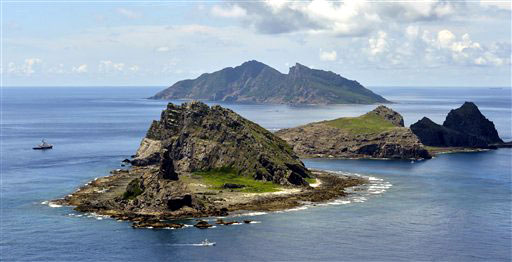China vows to take ‘necessary measures’ to defend territory

A Japanese survey ship, left, chartered by Tokyo city officials, sails around the contested islands in the East China Sea. AP/Kyodo News
BEIJING—China has vowed to take “necessary measures” to defend its territory in response to Japan’s plan to “nationalize” uninhabited islands in the East China Sea within the month.
Analysts warned that Tokyo is pushing China-Japan ties into a corner.
Kyodo News agency reported that the Japanese government reached an agreement with the so-called “private owner” of the islands to pay 2.05 billion yen ($26.15 million) for the purchase of part of the chain, apparently three of the five main islands, in the East China Sea.
“We cannot help but ask where is Japan trying to lead the islands issue to?” said Foreign Ministry spokesman Hong Lei in response to a question on Wednesday about the reports.
“China is closely watching the situation and will take necessary measures to safeguard territorial sovereignty,” Hong said.
Article continues after this advertisementSources at the State Oceanic Administration told China Daily that the relevant authorities have made preparations in case of any emergencies.
Article continues after this advertisementLu Yaodong, director of the department of Japanese diplomacy at the Institute of Japanese Studies at the Chinese Academy of Social Sciences, said Tokyo’s plan to “buy” the islands has, to some extent, derailed ties.
Ties have been strained since Shintaro Ishihara, the right-wing governor of Tokyo, unveiled plans on behalf of the city government to “purchase” the islands that Japan calls the Senkaku and China calls the Diaoyu.
Japanese Prime Minister Yoshihiko Noda, facing mounting nationalism and growing unpopularity over domestic policies, announced a plan in July to “nationalize” the islands, a move that prompted further protests from Beijing.
The plan is expected to be approved by the Japanese cabinet this month, Japan’s Fuji Television reported on Wednesday.
“In response to Japan’s plans to enhance its rival claim over the islands, China should take firm and powerful countermeasures to express the country’s determination to guard its sovereignty,” said Zhang Haiwen, deputy director of the China Institute for Marine Affairs.
Tokyo last week sent Tsuyoshi Yamaguchi, parliamentary senior deputy minister of foreign affairs, to China to cool tensions.
Yamaguchi also expressed Tokyo’s wish to see Noda and President Hu Jintao meet on the sidelines of the two-day Asia-Pacific Economic Cooperation summit, which is scheduled to start in Russia on Saturday.
Beijing has not confirmed any plan for the talks, and Chinese observers said Tokyo has not established an ideal atmosphere for the meeting.
The dispute over the islands grabbed headlines after a September 7, 2010, incident in which a Chinese fishing boat collided with Japanese coast guard ships near the islands. The Chinese fishing boat captain was arrested and then released.
The dispute had been on the back burner as Japan struggled to recover from last March’s devastating earthquake, tsunami and nuclear disaster.
But last month, Chinese activists landed on the islands after sailing from Hong Kong. They were arrested by Japanese authorities.
Days later, about a dozen Japanese rightists raised their country’s flag on the same island, prompting protests in cities across China. With reports from Liu Yedan and The Associated Press